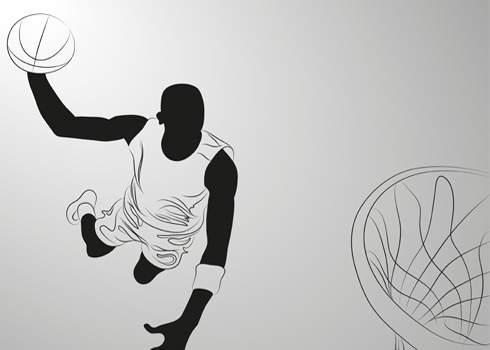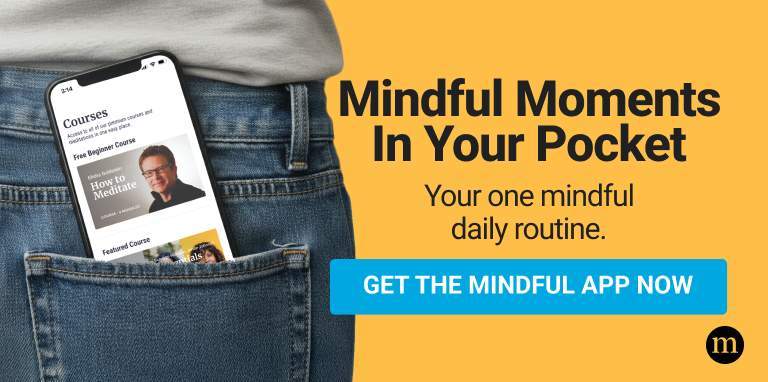For five years, George Mumford worked with NBA Championship team the Chicago Bulls, during the Michael Jordan years. He’s also been involved with the Los Angeles Lakers. He’s currently a sports psychologist and meditation teacher to many athletes and sports teams.
Soren Gordhamer: When you teach mindfulness to the Chicago Bulls or the Los Angeles Lakers, what do you feel that you are offering?
George Mumford: The opportunity to be in the moment. In sports, what gets people’s attention is this idea of being in the zone, or playing in the zone. When they are playing their best, they can do no wrong, and no matter what happens they are always a step quicker, a step ahead. That happens when we are in the moment, when we are mindful of what is going on. There’s a lack of self-consciousness, there’s a relaxed concentration, and there’s this sense of effortlessness, of being in the flow. We have that experience in other parts of our life, but we equate it with sports because there are rules and guidelines, and it is a situation where you get immediate feedback. When we are in the moment and absorbed with the activity, we play our best. That happens once and awhile, but it happens more often if we learn how to be more mindful. By mindful, I mean being aware, being engaged with the present moment. Mindfulness is useful because it is through this that we can see what is going on. It means knowing what needs to happen and doing it.
SG: Do you encourage the players you work with to do meditation practice?
GM: Oh, you can’t do it without the meditation practice. This is not just about being good in sports, this is warrior training. You can’t just be focused in a basketball game; it’s a full-time job. Warriors have known this for a long time. When you go into combat, you cannot be afraid. You have to be able to deal with your emotions and be clear about what you are attempting to do and how you’re going to do it. A lot of people go out and play basketball and don’t think much about it. That’s fine, but when you get into organized basketball and other team sports, you’ve got to know what your teammates are doing. Mindfulness teaches you how to develop certain skills and possibilities. When it comes to sports, you’ve got to know what you are doing and its impact. So you can look at a basketball game as just going out there and playing or you can look at it as understanding the science of basketball, understanding how to be the most effective basketball team. On one level, you have to bring in your personal skills, but on the other hand, you have to blend your skills with your teammates’ skills.
For example, if you are in a game and shooting a free throw, you have to pay attention. If it is short, you need to shoot longer next time. If it goes straight and hits the front rim, you need to get more of an arc on the shot. Now, what informs you to do that? A lot of this stuff we do automatically, but there is a process to it. Do you go in and say, “I’m going to make this shot”? No, ideally, you have practiced so much that all you have to do is step up to the line without thinking about it, and shoot.
SG: Without self-consciousness?
GM: Yes, without self-consciousness. Sometimes you can do that, sometimes you can’t. If the person fouls you pretty hard or if the official missed three other fouls or if you just had a shot blocked or if your girlfriend or boyfriend is in the stands, it might be harder. But the bottom line is that when you go to the line, you cannot have distractions. One of the main abilities to playing well is concentration or focus.
SG: Do some of the players give you a hard time when you come in and have them meditate?
GM: No, they don’t give me a hard time because I come with an impressive resume. I’ve worked with MJ (Michael Jordan), the Bulls, and Phil Jackson. I come in and I’m supported by the power structure. I first just get them to the table. I try to get them interested. I have got about ten seconds to get their attention. Once I get their attention, I tell them the benefits. When I talk about being in the zone, they understand that. After that, I have them try it. I tell them that if they try to get in the zone, they can’t. But if they pay attention, the zone will happen as a by-product. There are other elements involved, but that is the main part. It’s about the ability to be both relaxed and alert.
SG: Do you have athletes who do mediation before a game?
GM: I encourage them to do meditation all the time. This may include before a game but is not limited to this.
SG: How long a meditation do you do?
GM: It depends on the team. I find the balance that is right for the group. The amount of time is not as important as the quality.
SG: And the response?
GM: Some are into it, others are not. But even if they don’t like it, they will benefit from it. So the real question is, are they teachable? I get resistance from some people, but I never got any overt resistance from the Bulls. When you are a team, you do what is good for the team.
SG: We have kids who often relate the mindfulness meditation practice to drug experiences, that the feeling of being relaxed and peaceful is similar to what they seek in drugs.
GM: You don’t have to explain it to me. I was a heroin addict for a long time, so I know. It’s a similar kind of high, but different. When you first meditate, you may feel good but it is not likely going to give you the same experience as certain drugs. When you take drugs, the drugs have an impact on your receptors and your endorphins. They are helping you experience something that you already have. They ignite and sensitize you to feeling your own endorphins. It’s internal. So the question is, how to develop that so you have other ways to access it? That’s when you have the experience of being in the zone.
However, some people try to get a certain high as a means of getting away from their current emotional state. Mindfulness teaches you that it is by opening to your experience that you get freedom from it. It does not work to try to get away from a particular experience. It is about opening rather than pushing away.
SG: For a young person who is in a situation where they have done a lot of harm both to themselves and others, and they are wanting to change from a more violent warrior to a spiritual warrior, what do you think can help bring that about?
GM: Oh, very simple. You have to understand that your actions have consequences. It’s important to notice your intention. Sometimes we do not know that we intend to hurt people until afterwards. If you realize that you have hurt people, this is a spiritual undertaking. All the spiritual traditions talk about this. You have to take personal responsibility, and not say the drugs made me do it or my friend made me do it. Then you have to make amends. But the main thing is to learn from your mistakes and not do it again.
You can say that my friend made me do it or the person pissed me off, but you made a choice to act in a certain way. You can make another choice. You can walk away next time. But you think, “I’ll be a chump if I walk away.” Well, that’s an idea you have. You do the act so you will not be thought of as a chump but then you are a jailbird. Would you rather be a chump or a jailbird? It takes more courage to walk away than to stay and get involved. If you shoot someone, that person has relatives, they have homies. Actions always have consequences.
You have got to focus on yourself. It is a lot harder to conquer yourself than it is to conquer others. This is the hardest thing we have to do, but it is also the most beneficial. And it all happens in the present moment. This moment is all we’ve got. It is only in the present moment that we can make changes. And you are not just making these changes for yourself; you are doing it for everyone. Everyone will benefit.
Posted with permission from MBA Allstars







